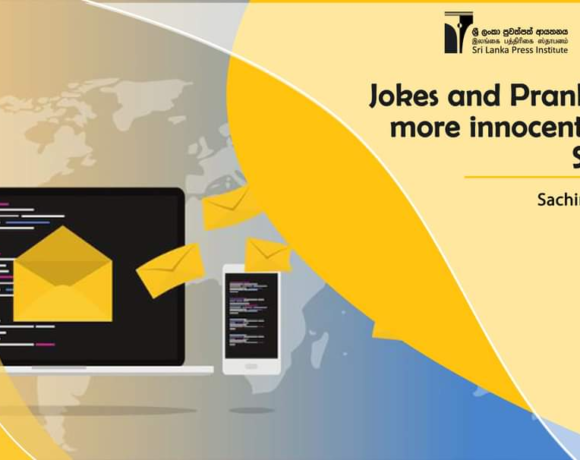Viranjana Herath
Although disinformation is not a novel concept, it has become a burning issue with the development of internet-based media platforms. How does disinformation make adverse impacts both in international and domestic scenarios?
In this regard, identifying disinformation is essential because there are several related terms such as fake news, disinformation, misinformation and mal-information.
Disinformation, the most common category in the phenomenon, is “false or misleading information that is created or disseminated with the intent to cause harm or to benefit the perpetrator. The intent to cause harm may be directed toward individuals, groups, institutions, or processes.” Accordingly, disinformation is false or misleading, and it must be done with intention (mens rea) to cause harm or to get a benefit.
How does disinformation harm international relationships? In the case of Lisa, a story of a missing Russian girl in Germany, it added pressure on the relationship between the two countries. Later it was confirmed that most of the issues were based on disinformation. Recently, news spread on the death of North Korean leader Kim Jon Un but it was later revealed to be disinformation. Although some parties have not experienced any negative impact based on such disinformation, it creates unnecessary issues, divisions, and discussions between nations that would damage world order.
Domestically, the extensive spread of disinformation has the potential for extremely negative impacts on individuals and society.
As highlighted by the United Kingdom’s House of Commons’, Digital Culture, Media and Sport Committee, disinformation creates damages to existing democratic values; significantly, it would badly influence people’s decision making and thinking process. During the 2016 US presidential election, disinformation spread that candidate Hilary Clinton was operating a child trafficking ring, which may have influenced voters.
Moreover, disinformation has been identified as an aspect that caused a negative impact on national security. For instance, there has been disinformation on North Korea’s nuclear weapons testing, and Iran’s’ powers and activities. Those build unnecessary panic in some countries and create a sense of instability to world peace.
Disinformation could have adverse effects on economies too. The best example is the dive of the Dow Jones in 2013. On 23rd of April 2013, Associated Press’ Twitter account was hacked, and a fake tweet was posted stating there were two explosions at the White House and that President Barack Obama had been injured. It caused a US$ 1.36 million dive of the Dow Jones even though AP clarified the hacking within 3 minutes.
Disinformation could also create several negative impacts on human rights. Article 25, of the ICCPR, mentions the right to free and fair elections and that voters need to have accurate information about the parties, candidates and other factors. Incorrect information may influence the decisions as mentioned earlier.
Disinformation could even create several negative impacts on the right to health. Article 12 of the ICESCR describes the right to healthcare as “the right of everyone to the enjoyment of the highest attainable standard of physical and mental health”. Disinformation has caused unnecessary fears and doubts about some vaccines and medicines that could help cure people.
The most controversial scenario is the role of disinformation during a pandemic. Fake news contributed to worsening the SARS epidemic in 2003 and Cholera at the end of 2010 in East Asia and South Africa. The Coronavirus pandemic has been providing hundreds of examples for the impact of fake news that worsen the situation.
The right to privacy mentioned in Article 17 of the ICCPR is one of the primarily hit human rights by way of disinformation. Disinformation creators make hundreds of stories that have false connections and false content, and it affects thousands and on many occasions, victims do not have any relationship with the stories. On other occasions, facts are distorted. Public figures such as politicians, actors, athletes, and journalists are among the victims.
The impact of disinformation on the right to freedom of expression is the most arguable issue in the scenario. Disinformation itself is an outcome of the right to freedom of speech and expression. More precisely, people use the right to freedom of expression to create disinformation. Although there have been reasonable restrictions to prevent misusing the right, it has been less efficient in the digital age. Therefore, some governments have introduced laws against disinformation. However, this approach also brings up questions because it undermines freedom of expression. For instance, the Malaysian Anti Fake News Act has been criticized as it grants unfettered discretion to authorities to target an expression they dispute the veracity of, or do not like.
Additionally, some governments use internet shutting downs and content blocking as an approach to regulating disinformation. For instance, in the first ten months of 2019, 30 countries worldwide blocked digital media outlets or the internet at least once. This causes the violating of the right to internet access that is a significant component of the right to freedom of expression.
Accordingly, modern-day disinformation creates several adverse impacts both internationally and domestically. It harms world order, peace, security and the friendly relationships between nations. Moreover, it makes exceptionally negative impacts on democracy, the thinking and decision-making processes of the people. It also creates issues on national security, economy and human rights.
Therefore, disinformation, mainly online practices, can be identified as an issue that should be countered immediately to prevent several adverse impacts. Conversely, the process should not negatively affect freedom of expression.









